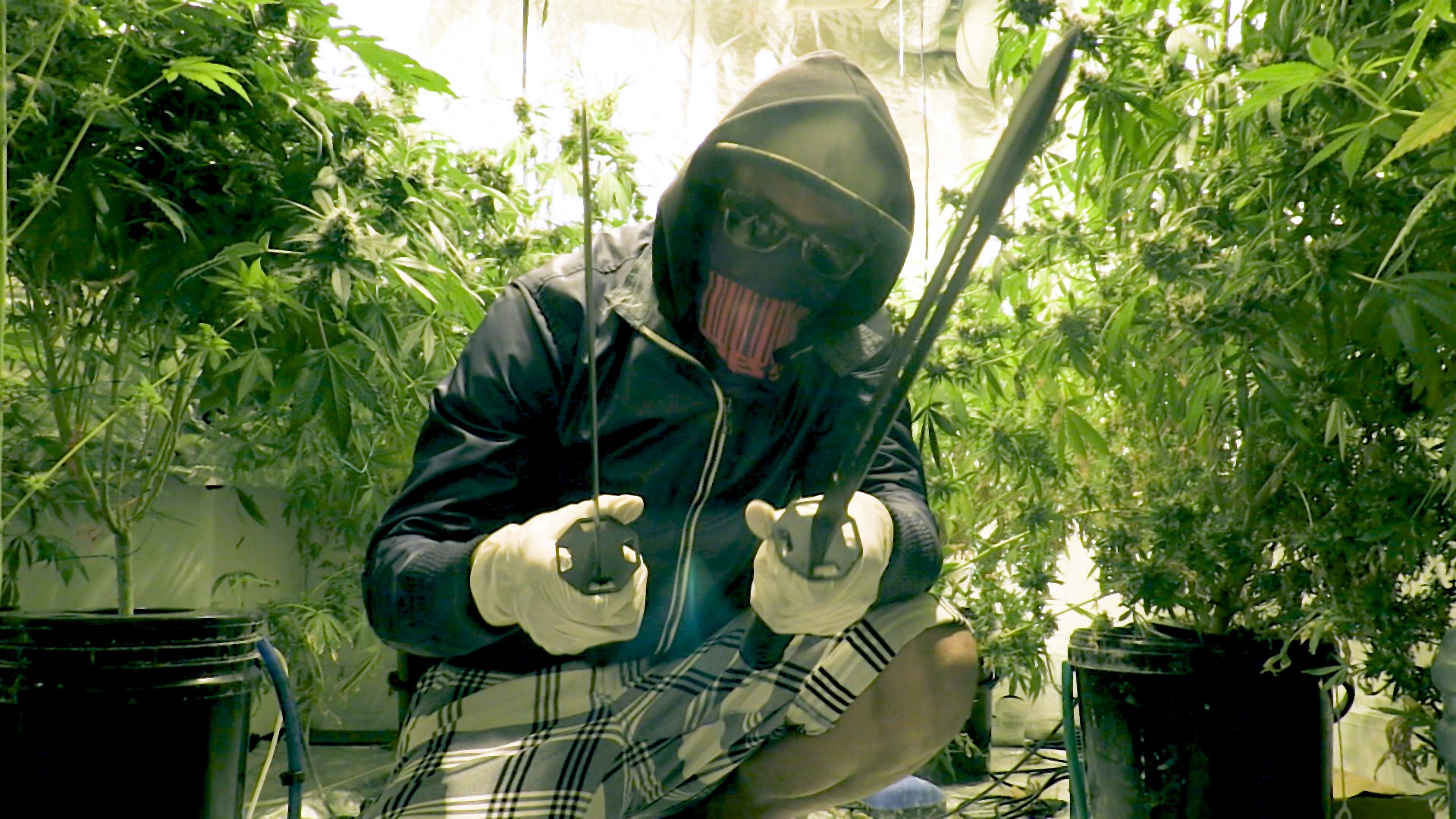Photo: VICE
When 21-year-old Efe* was furloughed from her job at the same time her university term finished, weed smoking became an easy distraction. Before the pandemic, she was smoking around three times a month. Pretty soon, that number slipped into three times a day. “It got to the point where no one had anything to do, nowhere to be, no deadlines,” she says, describing how her and her flatmates smoked weed each night and watched movies, out of pure boredom. Now a year has passed, and weed is still a daily thing.Efe's story isn't at all uncommon. If you smoked weed before the multiple lockdowns, chances are you're smoking more now rather than less. According to the 2020 Global Drug Survey (GDS), 39 percent of respondents said they'd increased their weed smoking since the onset of the pandemic. In the UK, that number was even higher, with 44 percent saying they'd upped their intake. Findings from the European Web Survey on Drugs also suggest that weed smoking has increased in the past year, mainly among people who were weed smokers already.The above isn’t all bad. People have been using weed to successfully de-stress since forever, and the medicinal properties of the plant are long known and much discussed. But if you've been waking and baking and the days are bleeding into one stoned haze, there are ways you can quit, or at least cut down before lockdown lifts.With that in mind, I called up Professor Adam Winstock – addiction psychiatrist and founder of the GDS – for some pointers on how to quit your weed habit now that there's a light at the end of the lockdown tunnel.“The first thing to say about cannabis dependency is that it generally comes on fairly slowly. If you smoke every day, that would be the first thing to look at. The second thing would be, if you start running out of weed and you’re looking at your bag thinking, ‘Oh shit, I better go and get some’, if the thought of running out of weed worries you, then that’d be the next thing. The third thing would be that if you go a day without weed and you find that you’re moody and irritable and can’t sleep, then that would be another flag.Cannabis dependency can slowly and silently make your life worse without ever getting bad enough to actually seem worth addressing. It might not destroy your life or ruin your health, but what people talk about is missing out on opportunities, or leaving potentials unfulfilled. I think it takes time from you. The most common thing I see with people I’m working with is, 'I woke up and I’ve got my to-do list. I’m going to go to the gym, go for a cycle, but I’ll have a quick spliff before I do that.' Then once you’ve had that first joint, it it takes time away.”“Basically, the rule for quitting any drug is: the quicker you stop, the more bouncy your withdrawal is. People who plan to quit generally do much better than people who are forced to quit because their dealer gets busted or whatever. So cutting down slowly absolutely makes a huge difference. Most people don’t do that. They want to knock it on the head immediately. But if you stop dead from smoking a couple of grams a day it’s going to be very different to if you cut that down gradually.For most people, if you try to reduce something like 25 percent every four or five days, that sort of rate works. But the most important thing is delaying your first joint. The beauty of that is that the joint that tends to get people the most stoned is the first joint of the day. And what I say to patients is: ‘I can get you more stoned by you having less. Go out, go for a walk, see some mates, do something. And if you’re not having that first joint until four o’clock, a little joint is going to make you a lot more stoned.’”“The first thing you should try is not using tobacco and not smoking. It trumps everything else. So, buy yourself a vaping device or look at edibles. People have to get used to making that shift. Vaping gives you a different effect to smoking. The high you get with tobacco is different, edibles come on more slowly and make you feel more ‘body stoned’. For someone who wants to go to work and come back and chill out for a couple of hours, have a little cookie and go to bed. That’s better than coming back, skinning up three joints and going to bed.”“A lot of people who smoke a lot of weed tend to drink a lot of caffeinated drinks. That might partly be to offset the fact that they’re slightly sedated because they’re stoned all day. One of the biggest problems for people who stop smoking weed is that they can’t sleep. So you need to cut down on your tea and coffee.Nicotine breaks down caffeine, so for people who then stop smoking weed and tobacco and carry on drinking lots of tea and coffee, those caffeine levels go through the roof, which increases peoples’ agitation and could worsen their insomnia.” “Exercise is really important. As people stop smoking, they become healthier and fitter. But also, cannabis is stored in your body fat and exercise can help release the tiny bits of cannabis that are stored in your system. It can also help you sleep.”“To make all of this easier, you could just go on holiday. People get used to using a drug within a particular environment. They’ve got their dealer, they’ve got their routine. Go on holiday for a couple of weeks. Change of scenery. Change of bed. It might be easier.”“People need to know what’s going to happen. It gets better. The irritability and moodiness normally kicks in around day two or three, but by day seven for most people it’s pretty much gone. Sleep and weird dreams can go on for weeks and some people can be moody and snappy for quite a while afterwards, but it gets better! Lots of people feel brighter. If you’re someone who quits weed and a few weeks later you go, ‘I’m miserable and depressed’, then you could have an underlying mental health problem and you need to get that treated.I think a lot of people will be helped by a return to that workday structure. A lot of people will have to be up at 7.30AM and changed and on the bus. The biggest reason for people smoking more right now is that they’re bored and they have time to do it. When people return and there are other opportunities, I think a lot of people are going to go, ‘Thank God for that.’”If you'd like to read more about quitting your weed habit, head over to the Global Drugs Survey website.*Name has been changed@daisythejones
“Exercise is really important. As people stop smoking, they become healthier and fitter. But also, cannabis is stored in your body fat and exercise can help release the tiny bits of cannabis that are stored in your system. It can also help you sleep.”“To make all of this easier, you could just go on holiday. People get used to using a drug within a particular environment. They’ve got their dealer, they’ve got their routine. Go on holiday for a couple of weeks. Change of scenery. Change of bed. It might be easier.”“People need to know what’s going to happen. It gets better. The irritability and moodiness normally kicks in around day two or three, but by day seven for most people it’s pretty much gone. Sleep and weird dreams can go on for weeks and some people can be moody and snappy for quite a while afterwards, but it gets better! Lots of people feel brighter. If you’re someone who quits weed and a few weeks later you go, ‘I’m miserable and depressed’, then you could have an underlying mental health problem and you need to get that treated.I think a lot of people will be helped by a return to that workday structure. A lot of people will have to be up at 7.30AM and changed and on the bus. The biggest reason for people smoking more right now is that they’re bored and they have time to do it. When people return and there are other opportunities, I think a lot of people are going to go, ‘Thank God for that.’”If you'd like to read more about quitting your weed habit, head over to the Global Drugs Survey website.*Name has been changed@daisythejones
Advertisement
IDENTIFY WHETHER YOU'VE GOT A PROBLEM AND IF YOU'D LIKE TO QUIT
Advertisement
GO SLOW RATHER THAN COLD TURKEY
TRY TO CUT OUT TOBACCO AND SMOKING
GO EASY ON THE CAFFEINE
Advertisement
EXERCISE

